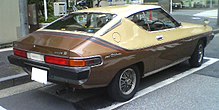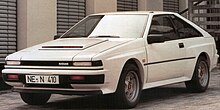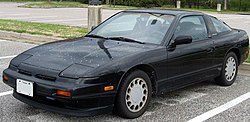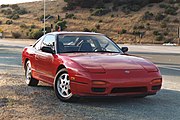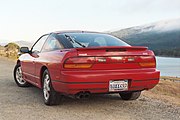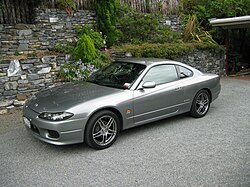Nissan 200SX
| Nissan 200SX | |
|---|---|
| Production period: | 1964-2002 |
| Class : | Middle class |
| Body versions : | Coupé , station wagon coupé , convertible |
The Nissan 200SX / Datsun 200SX, also called 180SX (Japan) or 240SX (USA), in Japan and other markets also called Nissan Silvia or (S110 and S12 series) Nissan Gazelle , is a passenger car model from the Japanese manufacturer Nissan .
Originally launched as the Datsun Coupe 1500, the vehicle was built from September 1964 to August 2002 under the same name in several stages of evolution.
Coupe 1500 / Silvia (CSP311, 1964–1968)
| 1st generation | |
|---|---|
|
Datsun Coupe 1500 (1964–1968) |
|
| Production period: | 1964-1968 |
| Body versions : | Coupe |
| Engines: |
Otto engine : 1.6 liters (66 kW) |
| Length: | 3985 mm |
| Width: | 1510 mm |
| Height: | 1275 mm |
| Wheelbase : | 2280 mm |
| Empty weight : | 980 kg |
The Datsun Coupe 1500 debuted at the Tokyo Motor Show in September 1964 and was also built as the Nissan Silvia CSP311. It was based on the Datsun Fairlady convertible and was styled by Albrecht Graf von Goertz . Only 554 pieces were produced. Most of the cars stayed in Japan , but 49 were exported to Australia and another 10 to other countries. The low production numbers and lengthy development process ensured that each car was unique and expensive. The purchase price was almost twice as high as the successor. Production ended in 1968.
The very short-stroke inline four-cylinder (bore × stroke: 87.2 × 66.8 mm, aluminum cylinder head) took 90 DIN or 96 SAE PS from 1595 cm³ at 6000 revolutions and made the coupé 165 km / h fast; 100 km / h was reached from a standing start in 12.7 seconds. It was shifted via a four-speed gearbox, braked with front disc and rear drum brakes. The body rested on a box frame.
200SX / Silvia (S10, 1975-1979)
| 2nd generation | |
|---|---|
|
Datsun Silvia (1975-1979) |
|
| Production period: | 1975-1979 |
| Body versions : | Coupe |
| Engines: |
Petrol engines : 1.8–2.0 liters (72–85 kW) |
| Length: | 4135-4320 mm |
| Width: | 1600 mm |
| Height: | 1300 mm |
| Wheelbase : | 2340 mm |
| Empty weight : | 990-1080 kg |
The S10 presented in the summer of 1975 was the first Silvia of the S series and a hatchback coupé with a wide C-pillar . It showed "baroque" lines than similar offers from the competition (namely the Toyota Celica ). In Japan, the S10 was equipped with an L18B engine with a displacement of 1.8 liters. On the North American market, the model was offered as the Datsun 200B with the L20B two-liter; It also had the required safety bumpers and was called the Datsun 200SX, corresponding to the engine size .
Its success in both markets was limited, as most buyers opted for the competing model Celica. At the beginning of 1979 the production of the S10 was ended.
| Datsun | Silvia 1800 | Silvia 1800i | 200SX (USA) |
|---|---|---|---|
| Engine: | 4-cylinder in-line engine (four-stroke) | ||
| Engine type: | L18 | L18E | n / A |
| Displacement: | 1770 cc | 1952 cc | |
| Bore × stroke: | 85 × 78 mm | 85 × 86 mm | |
| Performance at 1 / min: | 77 kW (105 PS) at 6000 |
85 kW (115 PS) at 6200 |
72 kW (98 PS) at 5600 |
| Max. Torque at 1 / min: | 147 Nm at 3600 | 152 Nm at 3600 | 138 Nm at 3200 |
| Compression: | 8.5: 1 | ||
| Mixture preparation: | 1 downdraft register carburetor or electronic injection | ||
| Valve control: | OHC , chain | ||
| Cooling: | Water cooling | ||
| Transmission: | 4- or 5-speed gearbox, rear-wheel drive (aW three-speed automatic) |
||
| Front suspension: | Suspension struts, wishbones, tension struts, coil springs, stabilizers | ||
| Rear suspension: | Rigid axle with coil springs | ||
| Brakes: | Disc brakes at the front, drum brakes at the rear | ||
| Steering: | Recirculating ball steering | ||
| Body: | Sheet steel, self-supporting | ||
| Track width front / rear: | 1280/1265 mm | ||
| Wheelbase: | 2340 mm | ||
| Dimensions: | 4135 (USA: 4320) × 1600 × 1300 mm | ||
| Empty weight: | 990 kg | 990 kg | 1070 kg |
| Top speed: | 165-180 km / h | ||
| 0-100 km / h: | not specified | ||
| Consumption (liters / 100 km, factory): | 9.5 | ||
200SX / Sakura / Silvia (S110, 1979–1983)
| 3rd generation | |
|---|---|
|
Datsun Silvia / 200SX (1979-1983) |
|
| Production period: | 1979-1983 |
| Body versions : | Coupé , station wagon coupé |
| Engines: |
Petrol engines : 1.8–2.2 liters (76–99.5 kW) |
| Length: | 4400-4480 mm |
| Width: | 1680 mm |
| Height: | 1310 mm |
| Wheelbase : | 2400 mm |
| Empty weight : | 1005-1090 kg |
The new edition of the Silvia, published in early 1979, available as a two-door hardtop coupé with a notchback and as a three-door hatchback model, was originally supposed to have a rotary engine designed and built by Nissan . However, the engine proved to be unreliable during testing and did not go into production. Ironically, the S110 shared its code number with the ill-fated Mazda 110 S Cosmo , the first Japanese car with a rotary engine. When the Wankel engine came to an end, the S110 was redesigned and received conventional piston engines from the new Z engine family, including the Z20 two-liter and the injected, turbocharged Z18ET 1.8-liter. In North America the model was offered as the Datsun 200SX and in Mexico as the Datsun Sakura .
The motorsport version Silvia 240RS with the 2.4 liter DOHC FJ24 engine was based on this Silvia generation . The 240RS was built until mid-1985 and thus survived the end of production of the regular Silvia S110 in autumn 1983 by two years. It served as Nissan's factory model in the 1983-1985 world rally championships and finished second in the 1983 New Zealand rally.
| Nissan Silvia | 1800 | 1800i | 1800 turbo | 2000 | 200SX (USA) |
|---|---|---|---|---|---|
| Engine: | 4-cylinder in-line engine (four-stroke) | ||||
| Engine type: | Z18 | Z18E | Z18ET | Z20E | n / A |
| Displacement: | 1770 cc | 1952 cc | 2188 cc | ||
| Bore × stroke: | 85 × 78 mm | 85 × 86 mm | 87 × 92 mm | ||
| Performance at 1 / min: | 77 kW (105 PS) at 6000 |
84.5 kW (115 hp) for the 6200 |
99.5 kW (135 hp) at 6000 |
88 kW (120 PS) at 5600 |
76 kW (103 PS) at 5600 |
| Max. Torque at 1 / min: | 147 Nm at 3600 | 152 Nm at 3600 | 196 Nm at 3600 | 167 Nm at 3600 | 175 Nm at 3600 |
| Compression: | 8.5: 1 | 8.3: 1 | 8.5: 1 | ||
| Mixture preparation: | 1 downdraft carburetor | injection | Electric injection, turbocharger | injection | |
| Valve control: | OHC , chain, 2 valves per cylinder | ||||
| Cooling: | Water cooling | ||||
| Transmission: | 4- or 5-speed gearbox (Turbo and 2000 only five-speed gearbox) aW (except Turbo) three-speed automatic rear - wheel drive |
||||
| Front suspension: | Wishbones with tension struts, struts, coil springs | ||||
| Rear suspension: | Rigid axle, longitudinal and trailing arms, coil springs | ||||
| Brakes: | Front disc brakes, rear drum brakes, turbo brake booster : four-wheel disc brakes, brake booster |
||||
| Steering: | Recirculating ball steering, aW servo-assisted | ||||
| Body: | Sheet steel, self-supporting | ||||
| Track width front / rear: | 1345/1340 mm | ||||
| Wheelbase: | 2400 mm | ||||
| Dimensions: | 4400 (USA: 4480) × 1680 × 1310 mm | ||||
| Empty weight: | 1005-1090 kg | 1100-1150 kg | 1085-1105 kg | 1185-1195 kg | |
| Top speed (editorial / factory information): | 165 km / h | 175 km / h | 180 km / h | 180 km / h | 175 km / h |
| 0-100 km / h: | n / A | ||||
| Consumption (liters / 100 kilometers; estimates or ECE city cycle): |
10.9-11.4 S | approx. 11-16 p | approx. 9.5 p | ||
200SX / Silvia (S12, 1983-1989)
| 4th generation | |
|---|---|
|
Nissan Silvia (1983-1989) |
|
| Production period: | 1983-1989 |
| Body versions : | Combi coupe |
| Engines: |
Gasoline engines : 1.8–2.0 liters (90–107 kW) |
| Length: | 4350-4430 mm |
| Width: | 1660 mm |
| Height: | 1330 mm |
| Wheelbase : | 2425 mm |
| Empty weight : | 960-1240 kg |
The S12 was produced from autumn 1983 to mid-1989 and received many changes along the way and different names in the respective regions. In Taiwan, for example, the model was assembled by the Yulon Motor Company and was offered there as the Yue Loong Elite 601 .
The S12 was called the 200SX in North America. The coupe was fitted with the CA20E, an injected two-liter four-cylinder, while the hatchback got either the CA20E or the CA18ET. In the USA, Nissan took the hatchback model with the CA18ET turbo engine from the market in mid-1987 and instead introduced the "SE" model with the VG30E three-liter (118 kW / 160 PS).
The S12 was called Silvia in Europe. There was only the hatchback model here. This was equipped with the CA18ET and in some countries with the FJ20E. In Japan, the S12 was also known as the Silvia and was available with both a notchback and a hatchback. The RS and RS-X variants were new. The RS was equipped with the FJ20E, while the RS-X was equipped with the FJ20ET.
In mid-1987 Nissan replaced the FJ engines with the CA18DET, a 1.8-liter four-cylinder with two overhead camshafts, injection and turbocharger. In Australia the S12 got the name Gazelle. This was also available as a coupé and hatchback and powered by the CA20E.
The coupé, which cost DM 26,995, was powered by a 107 kW / 145 PS two-liter four-cylinder with 16 valves. In March 1985, a variant with a 1.8-liter turbo engine and catalytic converter (90 kW / 122 PS, DM 29,895) appeared, and in April 1985 the Silvia Grand Prix version with wider tires, flared fenders and side skirts for a price of DM 32,995 followed.
In the summer of 1987 there was a slight facelift with modified front and rear sections.
In Germany, the Silvia S12 was sold exclusively as a hatchback model from the beginning of 1984 to mid-1989.
Engines
| CA18S | CA18E | CA18ET | CA18DE | CA18DET | CA20E | FJ20E | FJ20ET | VG30E | ||
|---|---|---|---|---|---|---|---|---|---|---|
| Motor type | Naturally aspirated engine | Naturally aspirated engine | turbo | Naturally aspirated engine | turbo | Naturally aspirated engine | Naturally aspirated engine | turbo | Naturally aspirated engine | |
| Valve control | SOHC 8 valves | SOHC 8 valves | SOHC 8 valves | DOHC 16 valves | DOHC 16 valves | SOHC 8 valves | DOHC 16 valves | DOHC 16 valves | SOHC 12 valves | |
| cylinder | 4th | 4th | 4th | 4th | 4th | 4th | 4th | 4th | 6th | |
| Displacement | 1809 cc | 1809 cc | 1809 cc | 1809 cc | 1809 cc | 1974 cc | 1990 cc | 1990 cc | 2960 cc | |
|
Power (kW / PS at 1 / min) |
71/98 at 5600 | 66/90 at 6000 | 90/122 at 5200 | 99/135 at 6000 | 99/135 at 6400 | 124/169 at 6400 | 75/102 at 5200 | 107/145 at 6400 | 140/190 6500 | 118/160 on 5200 (until 1987) 121/165 on 5200 (1988) |
| Max. Torque (Nm at 1 / min) | 149 at 2800 | 133 at 4000 | 182 at 3200 | 191 at 4000 | 191 at 5200 | 212 at 4000 | 157 at 3200 | 184 at 4800 | 235 at 4800 | 236 at 4000 |
| drive | Rear wheel drive | |||||||||
| transmission | Four-speed automatic / five-speed manual transmission | |||||||||
180SX / 200SX / 240SX (S13, 1989–1993)
| 5th generation | |
|---|---|
|
Nissan 200 SX "Zenki" (1989–1990) |
|
| Production period: | 1989-1993 |
| Body versions : | Combi coupe |
| Engines: |
Petrol engines : 1.8–2.4 liters (103–151 kW) |
| Length: | 4470-4540 mm |
| Width: | 1690 mm |
| Height: | 1290 mm |
| Wheelbase : | 2475 mm |
| Empty weight : | 1110-1250 kg |
In the spring of 1989 the S12 was replaced by the 200SX S13 “Zenki”, which was sold relatively well in Germany for a Japanese sports coupé . The longitudinally installed CA18DET engine had a displacement of 1.8 liters and 16 valves and achieved 124 kW (169 hp ) with its turbocharger ; this machine was offered in Japan, New Zealand and Europe. The weight was given as approx. 1,200 kg, the acceleration was 7.5 s to 100 km / h. The top speed was 230 km / h, the price at the presentation of DM 39,995.
The technology on this model was state-of-the-art for the time. In Europe there was only the hatchback version as the RS13, while in Japan and the USA there was also a coupé with a notchback and even a convertible version. There was also the Silvia series, which did without pop-up headlights .
In Europe, the 200SX received a facelift in the summer of 1990, whereby the version was called "Chuki" and can be recognized by the rounder front section. This model also has other seats (with a separate headrest), a larger brake system on the front axle (280 mm disc diameter instead of 257 mm) and other little things (e.g. turbo oil line and stabilizers). It is unusual that the variants flow into one another, e.g. B. Few of the first models after the revision still have the smaller front axle brake. But there were also "Zenki" models which already had the seats with the separate headrest.
Nissan generally caused a lot of confusion with the name of this 200SX. In the USA the car was sold with a 2.4-liter naturally aspirated engine, first with the KA24E (12 valves SOHC) and then from July 1990 with the KA24DE (16 valves DOHC), and was therefore given the name 240SX.
In Japan, the name was also chosen according to the displacement, which is why the car was called 180SX there. From summer 1990, Nissan changed the engine in the 180SX and equipped the RPS13 with the 2-liter unit SR20DET, also with turbocharging. This early version of the SR20DET developed 151 kW (205 PS).
In Europe, the model continued to be offered with the CA18DET until the end of 1994. There the S13 was always referred to as the 200SX despite its smaller engine .
In Taiwan, the model assembled by the Yulon Motor Company was called the Yue Loong Elite 801 .
200SX / 240SX / Silvia (S14, 1993-1999)
| 6th generation | |
|---|---|
|
Nissan 200SX (1993-1996) |
|
| Production period: | 1993-1999 |
| Body versions : | Coupe |
| Engines: |
Petrol engines : 2.0 - 2.4 liters (115–162 kW) |
| Length: | 4520 mm |
| Width: | 1730 mm |
| Height: | 1300 mm |
| Wheelbase : | 2525 mm |
| Empty weight : | 1140-1340 kg |
The S14 made its debut in Japan in the fall of 1993. It was lower, shorter and slightly wider than the S13. The wheelbase and track have been enlarged for better handling. In contrast to the other markets, the car remained popular in Japan. The Silvia S14 received a new version of the SR20DET with the larger T28 turbocharger. In Japan this had 161 kW (220 PS), the KA24DE 155 PS.
The 200SX underwent a facelift in the summer of 1996 (internal name: S14a). It received more aggressively shaped headlights and modified rear lights. Technical "deficiencies" have been corrected (e.g. slightly tearing elbow etc.), MAP sensor was omitted, seat heating, leather upholstery and air conditioning standard (in DE). The interior has been refreshed (speedometer, steering wheel).
The special models Z Edition , Racing and Sportline were introduced, which differed in details such as color, rims, spoiler lips and interior trim. This updated version is known as the Kouki S14 or the S14a (Europe). It was produced until autumn 1999.
There was also a sports model from Nismo called the 270R , of which only 50 were made. The Yulon Motor Company also assembled the S14 in Taiwan . But this time the model was in the luxury class and was named as AREX Elite 901 in its new luxury brand, according to the manufacturer .
| Nissan Silvia | 200SX | 200SX Turbo | 240SX (USA) |
|---|---|---|---|
| Engine: | 4-cylinder in-line engine (four-stroke) | ||
| Engine type: | SR20DE | SR20DET | KA24DE |
| Displacement: | 1998 cc | 1998 cc | 2389 cc |
| Bore × stroke: | 86 × 86 mm | 86 × 86 mm | 89 × 96 mm |
| Performance at 1 / min: | 118 kW (160 hp) at 6400 |
147–162 kW (200–220 hp) at 6400 |
115 kW (155 PS) at 5600 |
| Max. Torque at 1 / min: | 188 Nm at 4800 | 265–275 Nm at 4800 | 217 Nm at 4400 |
| Compression: | 10.0: 1 | 8.5: 1 | 9.5: 1 |
| Mixture preparation: | Electronic injection | Electric injection, turbocharger, intercooler | Electric injection |
| Valve control: | DOHC , chain, 4 valves per cylinder | ||
| Cooling: | Water cooling | ||
| Transmission: | 5-speed transmission aW four-speed automatic rear-wheel drive |
||
| Front suspension: | Wishbones with tension struts, struts, coil springs | ||
| Rear suspension: | Multi-link axle, coil springs | ||
| Brakes: | Disc brakes all around, brake booster, ABS | ||
| Steering: | Rack and pinion steering, servo-assisted | ||
| Body: | Sheet steel, self-supporting | ||
| Track width front / rear: | 1480/1470 mm | ||
| Wheelbase: | 2525 mm | ||
| Dimensions: | 4520 × 1730 × 1300 mm | ||
| Empty weight: | from 1140 kg | from 1220 kg | 1250 kg |
| Top speed (editorial / factory information): | approx. 210 km / h | 223-235 km / h | approx. 210 km / h |
| 0-100 km / h: | 7.5 s | 6.5 s | 7.8 s |
| Consumption (liters / 100 kilometers; estimates or ECE city cycle): |
approx. 7–12 p | 10.6-12.1 S | n / A |
Silvia (S15, 1999-2002)
| 7th generation | |
|---|---|
|
Nissan Silvia Coupe (1999-2002) |
|
| Production period: | 1999-2002 |
| Body versions : | Coupé , convertible |
| Engines: |
Petrol engines : 2.0 liters (118-184 kW) |
| Length: | 4440 mm |
| Width: | 1695 mm |
| Height: | 1290 mm |
| Wheelbase : | 2525 mm |
| Empty weight : | 1200-1250 kg |
The seventh and last generation appeared in Japan in autumn 1999: the Silvia S15. The SR20DET developed 184 kW (250 PS) here. The two-liter turbo gained strength thanks to minor changes to the turbocharger and engine management. The SR20DE (without turbo) had 121 kW (165 PS). In Germany, the Silvia S15 was not officially offered by Nissan.
This Silvia was given an aggressive interior and exterior design, an improved chassis and, for the first time, a six-speed manual transmission (in addition to a manual five-speed gearshift and a four-speed automatic).
Initially, the new Silvia was only offered as Spec-S (without turbocharger) and Spec-R (turbo); both models were available with an aero package that included a large rear wing and small side skirts. The Spec-R had the six-speed gearbox, a harder chassis and a stiffer body, four-piston disc brakes at the front, a larger brake servo, a more effective limited-slip differential and, for a surcharge, the four-wheel steering HICAS; the Spec-S had to get along with the five-speed gearbox (or with the automatic transmission, which was also available for the Spec-R) and without the additional stiffeners and the other features of the Spec-R.
The range was later expanded to include a number of luxury and sports packages that were available for both Spec-S and Spec-R. Autech Japan , Nissan's special vehicle division, also offered some tuned S15 versions, such as the style-A with body extensions and interior fittings in the style of the Ferrari 456 based on Spec-S or Spec-R; Another Autech model was based on the Spec-S and had a naturally aspirated engine tuned to 200 HP (higher compression, sharper camshafts, sports manifold and exhaust, modified engine management) and a sports suspension. This special model also had the six-speed gearbox and the other equipment features of the Spec-R.
From this generation there was also a convertible with a folding roof called Varietta . The Silvia Varietta was built by Autech, was based on the Spec-S and had a naturally aspirated engine and four-speed automatic or five-speed transmission of that version.
The S15 was also launched by the Taiwanese Yulon Motor Company . The new model was named AREX Elite 951 there . It was the last model in the Elite series, which includes a total of four generations.
Production of the Silvia ended in August 2002. Nissan was forced to reduce the large number of different platforms used in the group.
| Nissan Silvia | 2000 | 2000 turbo | |
|---|---|---|---|
| Engine: | 4-cylinder in-line engine (four-stroke) | ||
| Engine type: | SR20DE | SR20DET | |
| Displacement: | 1998 cc | 1998 cc | |
| Bore × stroke: | 86 × 86 mm | 86 × 86 mm | |
| Performance at 1 / min: | 121 kW (165 hp) at 6400 |
147–184 kW (200–250 hp) at 6400 |
|
| Max. Torque at 1 / min: | 192 Nm at 4800 | 265–275 Nm at 4800 | |
| Compression: | 10.0: 1 | 8.5: 1 | |
| Mixture preparation: | Electronic injection | Electric injection, turbocharger, intercooler | |
| Valve control: | DOHC , chain, 4 valves per cylinder | ||
| Cooling: | Water cooling | ||
| Transmission: | 5-speed gearbox aW four-speed automatic turbo: 5- or 6-speed gearbox, rear-wheel drive |
||
| Front suspension: | Wishbones with tension struts, struts, coil springs | ||
| Rear suspension: | Multi-link axle, coil springs | ||
| Brakes: | Disc brakes all around, brake booster, ABS | ||
| Steering: | Rack and pinion steering, servo-assisted | ||
| Body: | Sheet steel, self-supporting | ||
| Track width front / rear: | 1480/1470 mm | ||
| Wheelbase: | 2525 mm | ||
| Dimensions: | 4440 × 1695 × 1290 mm | ||
| Empty weight: | from 1200 kg | from 1240 kg | |
| Top speed (editorial / factory information): | approx. 210 km / h | 223-235 km / h | |
| 0-100 km / h: | 7.5 s | 6.5 s | |
| Consumption (liters / 100 kilometers; estimates or ECE city cycle): |
approx. 7–12 p | 12.9-15.9 p | |
Others
The vehicles of the S series are very popular worldwide as drift cars and tuning objects . There is a large number of tuning parts for the CA18 and SR20 engines.
swell
- Automobile revue. Catalog numbers 1979, 1982, 1998, 2001 (dates)
- Joachim Kuch: Japanese cars. Motorbuch Verlag, Stuttgart 1990, ISBN 3-613-01365-7 , pp. 198-200.
Web links
- Nissan Silvia CSP311 Archive of the CSP311
See also
Individual evidence


